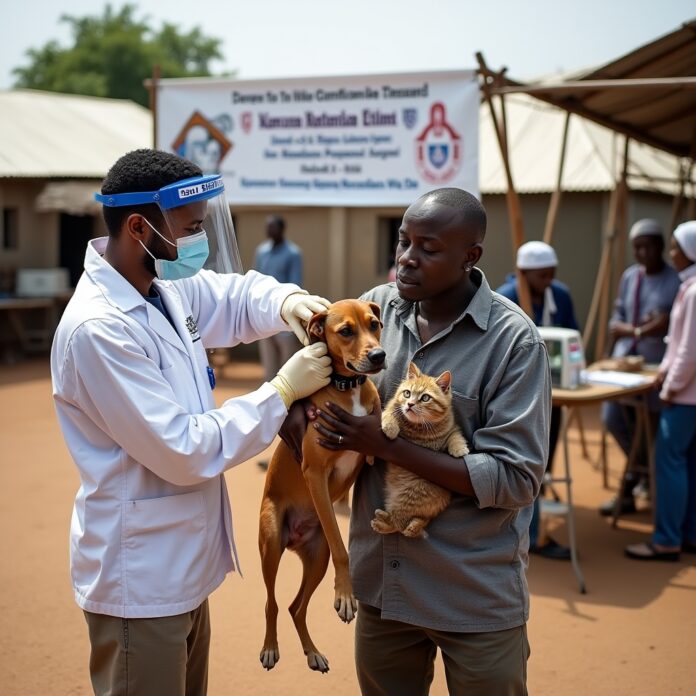Rabies, a fatal viral disease transmitted primarily through the bite of infected animals, poses a significant public health threat in many parts of the world, including Nigeria. In response to this challenge, Ogun State has initiated a series of free anti-rabies clinics aimed at curbing the spread of the disease and safeguarding both human and animal health. This article delves into the details of these clinics, their significance, and how residents can actively participate in this crucial public health initiative.
Ogun State’s Free Anti-Rabies Clinics: An Overview
In a concerted effort to combat rabies, Ogun State has established free anti-rabies clinics across all 20 local government areas. These clinics are strategically set up to ensure accessibility for all residents, particularly pet owners, to have their animals vaccinated against rabies without incurring any costs.
The clinics are typically operational during designated hours, with schedules announced in advance through local media channels, community bulletins, and the official Ogun State Ministry of Agriculture website. It’s advisable for pet owners to stay informed about these schedules to take advantage of the free vaccination services.
Importance of Dog Vaccination Week
Dog Vaccination Week plays a pivotal role in the global effort to eliminate rabies, as dogs are the primary source of human rabies deaths. The World Health Organization (WHO) has set a target to eliminate dog-mediated human rabies deaths by 2030. Achieving this goal requires vaccinating at least 70% of the dog population to break the transmission cycle.
In Nigeria, where rabies remains endemic, initiatives like Dog Vaccination Week are crucial in raising awareness, providing vaccinations, and engaging communities in preventive measures. Ogun State’s active participation in this initiative underscores its commitment to achieving a rabies-free environment.
Details of the Free Anti-Rabies Clinics
The free anti-rabies clinics in Ogun State offer the following services:
- Rabies Vaccination: Administering the rabies vaccine to dogs and cats to protect them from the virus.
- Health Check-ups: Basic health assessments to identify any immediate medical concerns.
- Vaccination Certificates: Issuance of certificates confirming that the animal has been vaccinated, which may be required for licensing or travel purposes.
- Educational Materials: Distribution of pamphlets and information on rabies prevention and responsible pet ownership.
- Expert Advice: Opportunities to consult with veterinary professionals about pet care and disease prevention.
These services are provided at no cost to pet owners, emphasizing the state’s commitment to public health.
How Residents Can Participate
Residents can actively participate in the free anti-rabies clinics by:
- Bringing Pets to Clinics: Ensure that dogs are on a leash and cats are in carriers to prevent any incidents during the vaccination.
- Registering in Advance: Some clinics may require pre-registration to manage the flow of animals and ensure adequate vaccine supply.
- Providing Necessary Documentation: Bring any previous vaccination records to assist in maintaining accurate health histories.
- Following Post-Vaccination Care Instructions: Monitor pets for any unusual behavior or symptoms and report them to a veterinarian if necessary.
Active participation ensures the success of the vaccination efforts and contributes to the broader goal of rabies elimination.
Awareness and Education Efforts
Ogun State has implemented various public awareness campaigns to educate residents about rabies prevention. These include:
- Community Outreach: Engaging with local communities through town hall meetings and information sessions.
- Educational Materials: Distributing pamphlets, posters, and videos that explain the transmission of rabies, the importance of vaccination, and the steps to take if bitten by an animal.
- School Programs: Incorporating rabies education into school curricula to teach students about the dangers of rabies and the importance of responsible pet ownership.
- Media Campaigns: Utilizing local media channels to disseminate information about rabies prevention and the availability of free vaccination services.
These efforts aim to raise awareness and encourage responsible pet ownership practices among residents.
Challenges and Limitations
Despite the state’s efforts, several challenges hinder the achievement of a rabies-free environment:
- Low Vaccination Coverage: A significant barrier to rabies control is the low vaccination coverage among dogs in Ogun State. Many pet owners are either unaware of the importance of vaccination or face logistical challenges in accessing vaccination services.
- Free-Roaming Dogs: The practice of allowing dogs to roam freely contributes to the spread of rabies. Implementing leash laws and promoting responsible pet ownership are essential to mitigate this risk.
- Limited Public Awareness: While awareness campaigns have been conducted, misconceptions about rabies persist. Some individuals believe that rabies can be cured with herbal remedies or that only stray dogs are dangerous.
- Inadequate Reporting and Data Collection: Underreporting of dog bites and rabies cases hampers effective surveillance and response. The lack of accurate data makes it challenging to allocate resources appropriately and evaluate the impact of vaccination programs.
- Resource Constraints: Despite receiving support from the Federal Government, Ogun State faces resource constraints in sustaining vaccination campaigns and expanding coverage.
Addressing these challenges requires a multifaceted approach involving government agencies, veterinary professionals, community leaders, and residents.
A Collective Effort Towards a Rabies-Free Ogun State
Ogun State’s proactive measures in establishing free anti-rabies clinics and promoting dog vaccination are commendable steps towards eradicating rabies. However, the success of these initiatives hinges on the collective effort of the government, veterinary professionals, community leaders, and residents.
Strengthening community engagement through continuous education, enhancing surveillance and reporting systems, and enforcing existing laws related to dog confinement and vaccination can significantly reduce the risk of rabies transmission. By collaboratively overcoming these obstacles, Ogun State can make significant strides toward eliminating rabies and ensuring public health safety.
In conclusion, while Ogun State has made significant strides in combating rabies, achieving a rabies-free environment requires sustained efforts, collaboration, and active participation from all sectors of society. By working together, Ogun State can move closer to its goal of eliminating rabies and safeguarding public health.


